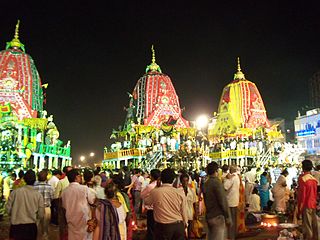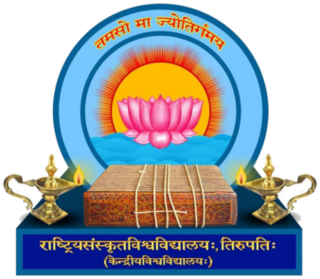
Lal Bahadur Shastri was an Indian politician and statesman who served as the second prime minister of India from 1964 to 1966. He previously served as the sixth home minister of India from 1961 to 1963.

Shishira is the season of winter in the Hindu calendar. It comprises the months of Pausha and Magha or mid-January to mid-March in the Gregorian calendar.
Department of Higher Education is the department under Ministry of Education, that oversees higher education in India.

Central universities in India are public universities established by an Act of Parliament and are under the purview of the Department of Higher Education in the Ministry of Education, except for nine universities which are under the purview of other ministries. In general, universities in India are recognised by the University Grants Commission (UGC), which draws its power from the University Grants Commission Act, 1956. In addition, 15 Professional Councils are established, controlling different aspects of accreditation and coordination. Central universities, in addition, are covered by the Central Universities Act, 2009, which regulates their purpose, powers, governance etc., and established 12 new universities.

Satya Vrat Shastri was an Indian Sanskrit scholar, writer, grammarian and poet. He wrote three Mahakavyas, three Khandakavyas, one Prabandhakavyas and one Patrakavya and five works in critical writing in Sanskrit. His important works are Ramakirtimahakavyam, Brahattaram Bharatam, Sribodhisattvacharitam, Vaidika Vyakarana, Sarmanyadesah Sutram Vibhati, and "Discovery of Sanskrit Treasures" in seven volumes.
Dr. Mandan Mishra was a noted Sanskrit scholar from India and founder of Shri Lal Bahadur Shastri Rashtriya Sanskrit Vidyapeetha. In 2000 he was awarded Padma Shri by Government of India for his excellent and devoted work in the field of Sanskrit.

Devarshi Kala Nath Shastry was born on 15 July 1936. He is a Sanskrit scholar and was honoured by the President of India in 1988. He is an Indologist and a prolific writer in Sanskrit, Hindi and English, and a well-known linguist, who has contributed to the campaign of evolving technical terminology in Indian languages and ensuring a respectable status for Hindi, the official language of his state and the Indian union.

The Ministry of Education (MoE) is a ministry of the Government of India, responsible for the implementation of the National Policy on Education. The ministry is further divided into two departments: the Department of School Education and Literacy, which deals with primary, secondary and higher secondary education, adult education and literacy, and the Department of Higher Education, which deals with university level education, technical education, scholarships, etc.

Grishma the Sanskrit word meaning summer. This is one of the six seasons (ritu), each lasting two months, the others being: Vasanta (spring), Varsha (monsoon), Sharada (autumn), Hemanta (pre-winter), and Shishira (winter).

Rewa Prasad Dwivedi was a Sanskrit scholar, poet, writer, teacher, and critic. His original works include poetry as epics and lyrics, plays, and prose. He wrote the new literature under the pseudonym "sanatana", meaning 'the eternal'. He is also known as 'Acharya' Dwivedi.

Central Sanskrit University, formerly Rashtriya Sanskrit Sansthan, is a central university located in New Delhi, India, to promote Sanskrit.

This timeline lists important events relevant to the life of the Vaishnava (Hindu) spiritual leader, poet, commentator, educationist, religious and social figure Rambhadracharya.
Veeranarayana N. K. Pandurangi is a Sanskrit scholar from Bangalore, worked in Jaipur, Rajasthan and at present he is the Principal of Karnataka Samskrit University's evening college. He was awarded the Maharshi Badrayan Vyas Award for Sanskrit by Pratibha Patil, the then President of India, for the year 2011. He is currently Professor and the Dean at the Department of Darshana, at the Jagadguru Ramanadacharya Rajasthan Sanskrit University, Jaipur. Pandurangi is a specialist in Darshan.

National Sanskrit University, earlier known as Rashtriya Sanskrit Vidyapeetha is a central university in Tirupati, Andhra Pradesh, India.

P. N. Pattabhirama Sastri was an Indian philologist and scholar of Sanskrit literature and Vedas, known for his works on Sanskrit Philology and Mīmāṃsā or the hermenutics of the Vedas. He was the founder vice chancellor of the Rashtriya Sanskrit Vidyapeetha, a deemed university dedicated to Sanskrit studies. He was also the founder of a non governmental organization in Uttar Pradesh for the promotion of arts, culture and education, which is now known as Shri Pattabhirama Shastri Veda Mimansa Anusandhan Kendra. Vaidikaśikṣādarśanabindhuḥ, Āpastambaśrautasūtra Dhūrtasvāmibhāsya, Mīmāṃsāśāstramālā, Tautātitamatatilaka and Śāstradīpikā, prabhāsahitā are some of his notable works. The Government of India awarded him the third highest civilian honour of the Padma Bhushan, in 1982, for his contributions to literature and education. Rashtriya Sanskrit Vidyapeetha honored its founder vice chancellor by naming its central library as Mahamahopadhyaya Sri Pattabhirama Sastri Library. The 8th volume of Kendriya-Saṃskṛtavidyāpīṭham anuvādagranthamālā has been republished as Mahamahopadhyaya Padmabhushana Sri P.N. Pattabhirama Sastri commemoration volume in his honor.

V. R. Panchamukhi, is an Indian Economist and Sanskrit scholar. He was born on September 17, 1936, in Dharwad, Karnataka. He is the eldest son of Vidyaratna Shri R. S. Panchamukhi, an archaeologist and indologist and Sanskrit Scholar.

The Vaishnava Matabja Bhaskara is one of the most prominent works of Ramananda in Sanskrit. This work is a dialogue between Ramananda and his disciple named Surasurananda.














